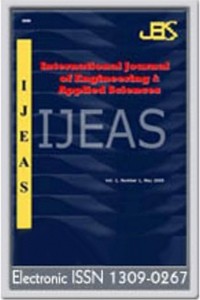Performance Estimation of Organic Rankine Cycle by Using Soft Computing Technics
In this study, the thermal efficiency values of Organic Rankine cycle system were estimated depending on the condenser temperature and the evaporator temperatures values by adaptive network fuzzy interference system (ANFIS) and artificial neural networks system (ANN). Organic Rankine cycle (ORC) fluids of R365-mfc and SES32 were chosen to evaluate as the system fluid. The performance values of ANN and ANFIS models are compared with actual values. The R2 values are determined between 0.97 and 0.99 for SES36 and R365-mfc, and this is satisfactory. Although it was observed that both ANN and ANFIS models obtained a good statistical prediction performance through coefficient of determination variance, the accuracies of ANN predictions were usually imperceptible better than those of ANFIS predictions.
Keywords:
Adaptive network fuzzy interference system, artificial neural networks system, Organic Rankine cycle, R365-mfc,
___
- [1] Roy, J.P., Mishra, M.K., Misra, A., Performance analysis of an Organic Rankine Cycle with superheating under different heat source temperature conditions. Applied Energy, 88(9), 2995-3004, 2011.
- [2] Zhang, X., He, M., Wang, J., A new method used to evaluate organic working fluids. Energy, 67, 363-369, 2014.
- [3] Solkane, Solkane Refrigerant Software. Germany.
- [4] Lemmon, E.W., Span, R., Thermodynamic Properties of R-227ea, R-365mfc, R-115, and R-13I1. Journal of Chemical & Engineering Data, 60(12), 3745-3758, 2015.
- [5] Atakan, B., Siddiqi, M.A., Investigation of the criteria for fluid selection in Rankine cycles for waste heat recovery. International Journal of Thermodynamics, 14(3), 2011.
- [6] Schenk, H., Evaluation of ORC processes and their implementationin solar thermal DSG plants, in Ingegneria Energetica. 2013, Milano.
- [7] Wang, E.H., Zhang, H.G., Fan, B.Y., Ouyang, M.G., Zhao, Y., Mu, Q.H., Study of working fluid selection of organic Rankine cycle (ORC) for engine waste heat recovery. Energy, 36(5), 3406-3418, 2011.
- [8] Wang, J., Yan, Z., Wang, M., Ma, S., Dai, Y., Thermodynamic analysis and optimization of an (organic Rankine cycle) ORC using low grade heat source. Energy, 49, 356-365, 2013.
- [9] Kosmadakis, G., Manolakos, D., Papadakis, G., Experimental investigation of a low-temperature Organic Rankine Cycle (ORC) engine under variable heat input operating at both subcritical and supercritical conditions. Applied Thermal Engineering, 92, 1-7, 2016.
- [10] Braimakis, K., Preißinger, M., Brüggemann, D., Karellas, S., Panopoulos, K., Low grade waste heat recovery with subcritical and supercritical Organic Rankine Cycle based on natural refrigerants and their binary mixtures. Energy, 88, 80-92, 2015.
- [11] Yılmaz, F., Selbaş, R., Şahin, A.Ş., Efficiency analysis of organic Rankine cycle with internal heat exchanger using neural network. Heat and Mass Transfer, 52(2), 351-359, 2015.
- [12] Kim, D.K., Lee, J.S., Kim, J., Kim, M.S., Kim, M.S., Parametric study and performance evaluation of an organic Rankine cycle (ORC) system using low-grade heat at temperatures below 80 °C. Applied Energy, 189, 55-65, 2017.
- [13] Li, J., Liu, Q., Duan, Y., Yang, Z., Performance analysis of organic Rankine cycles using R600/R601a mixtures with liquid-separated condensation. Applied Energy, 190, 376-389, 2017.
- [14] Zhang, M.-G., Zhao, L.-J., Xiong, Z., Performance evaluation of organic Rankine cycle systems utilizing low grade energy at different temperature. Energy, 127, 397-407, 2017.
- [15] Javanshir, A., Sarunac, N., Thermodynamic analysis of a simple Organic Rankine Cycle. Energy, 118, 85-96, 2017.
- [16] Kılıç, B., Optimisation of refrigeration system with two-stage and intercooler using fuzzy logic and genetic algorithm. International Journal Of Engineering & Applied Sciences, 9(1), 42-42, 2017.
- [17] Köse, E., Mühürcü, A., The control of non-linear chaotic system including noise using genetic based algorithm. International Journal of Engineering & Applied Sciences, 8(3), 49-57, 2016.
- [18] Kılıç, B., Alternative approach for thermal analysis of transcritical CO2 one-stage vapor compression cycles. International Journal of Engineering & Applied Sciences, 8(1), 1-6, 2016.
- [19] Şahin, A.Ş., Köse, İ.İ., Selbaş, R., Comparative analysis of neural network and neuro-fuzzy system for thermodynamic properties of refrigerants. Applied Artificial Intelligence, 26(7), 662-672, 2012.
- [20] Ertunc, H.M., Hosoz, M., Artificial neural network analysis of a refrigeration system with an evaporative condenser. Applied Thermal Engineering, 26(5-6), 627-635, 2006.
- [21] Kalogirou, S.A., Bojic, M., Artificial neural networks for the prediction of the energy consumption of a passive solar building. Energy, 25, 479–491, 2000.
- [22] Shojaeefard, M.H., Zare, J., Tabatabaei, A., Mohammadbeigi, H., Evaluating different types of artificial neural network structures for performance prediction of compact heat exchanger. Neural Computing and Applications, 2016.
- [23] Li, H., Tang, X., Wang, R., Lin, F., Liu, Z., Cheng, K., Comparative study on theoretical and machine learning methods for acquiring compressed liquid densities of 1,1,1,2,3,3,3-Heptafluoropropane (R227ea) via song and mason equation, support vector machine, and artificial neural networks. Applied Sciences, 6(1), 25, 2016.
- [24] Mago, P.J., Chamra, L.M., Somayaji, C., Performance analysis of different working fluids for use in organic Rankine cycles. Proceedings of the Institution of Mechanical Engineers, Part A: Journal of Power and Energy, 221(3), 255-263, 2007.
- Başlangıç: 2009
- Yayıncı: Akdeniz Üniversitesi
